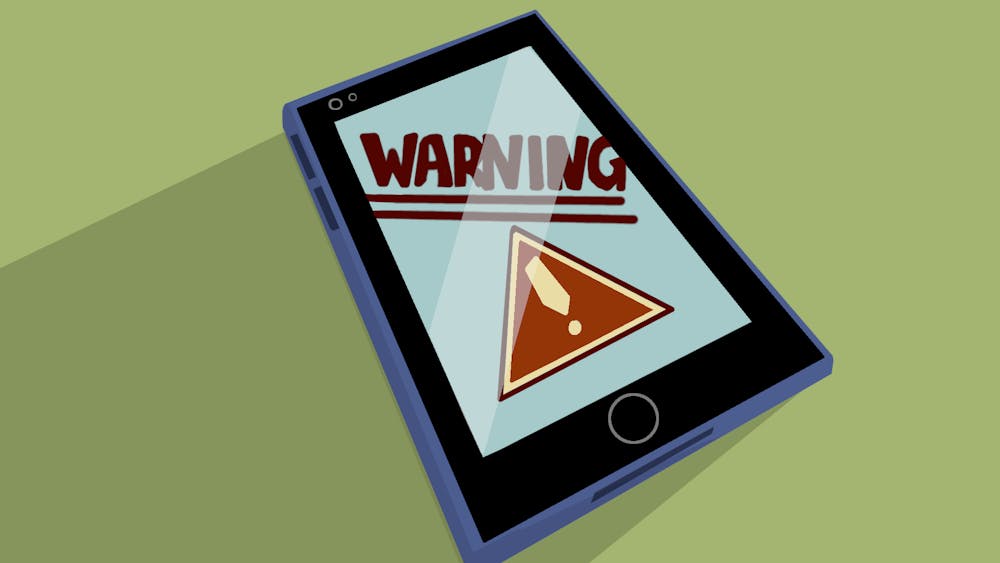The University Police Department has recorded a total of $74,150 lost to scams in the University community over the last 12 months, with losses ranging from $3,000 to $44,000 across eight separate incidents. Personal information, such as social security numbers and bank account information, have been stolen as well. The recent rise in scamming cases reflect a longstanding trend across the country.
UPD detectives Eric Pluta and Jamie Kennison — who handle these types of cases — identified several recurrent patterns, including faking government calls, posing as buyers on online marketplaces and threatening arrest.
“It used to be that … they would call you and it was so obviously a scam, right, and you just hang up on them,” Kennison said. “They’ve gotten smarter, just like we’ve gotten smarter, and so it is super convincing.”
The greatest amount of money lost — $44,000 — resulted from a scammer claiming an arrest warrant had been issued for the victim.
Pluta and Kennison debunked several types of scams that they have encountered frequently. For example, some individuals have pretended to be government agencies, like the Internal Revenue Service, and asked for money — these organizations, however, do not ask for payments over the phone. Students should not disclose their Social Security number or financial information to callers claiming to represent their financial institution. Other scammers have called students posing as computer repair companies and employment agencies.
One popular trend among scammers is to request payment in the form of gift cards and have individuals read off the gift card code to access money.
“We’ve had students who have agreed to buy these gift cards, and they keep the criminal on the cell phone for two and a half hours while they drive from store to store to store,” Pluta said.
Another type of scam Pluta pointed out occurs when individuals are trying to sell items online.
“No legitimate buyer sends you five, six, 10 times the amount of money you asked for, and then asks you to pay them the difference,” Pluta said. “That’s unrealistic and nobody’s going to do that.”
In these scenarios, the large amount of money the scammer sends turns out to be fake, and the individual loses the paid difference.
The COVID-19 pandemic has also brought forward a new type of scam targeting people eligible for stimulus checks. Households making less than $75,000 in 2019 were eligible to receive relief checks from the federal government to offset financial strain during the pandemic. The three checks released so far — one in March 2020, the second in December and the third in Mach 2021 — ranged from $600 to $1,400. Scammers posing as government workers can claim that an individual was not qualified to receive a check and have it sent to them under threat of arrest, Pluta said.
“This is the first time we’ve obviously had a pandemic, so people aren’t real sure what the rules of the check are,” Pluta said.
Threats of arrest, deportation and expulsion are all indicators of a scam, according to Pluta and Kennison. Even if messages are personalized with a student’s name and personal information, the sender may not be legitimate.
“If you get a text message or a call from a number you don't know, don't answer it,” Kennison said. “Wait till you get the voicemail.”
International students in particular have fallen victim to scamming cases on Grounds. Oftentimes, Pluta said, international students are not aware of how they should be contacted by U.S. government agencies. Pluta spoke to a group of international students a year ago to combat this vulnerability.
“I'm proud to say that within a week, I got a phone call from one of those students who said, ‘detective, that exact same thing you talked about during that lecture happened to me, and I hung up on the guy and didn't get ripped off,’ and that was very rewarding,” Pluta said.
If an individual is suspicious of a scam during a phone call, UPD advises that they hang up immediately and look up the caller and the organization they say they are a part of with an online search. For example, if a caller claims to be from the bank, an individual can contact the bank through the number listed on their website and ask if the call was legitimate.
If money or personal information has already been given away, individuals should report the incident to local police. They should also immediately contact their bank to prevent funds from being transferred out of their account.
“Have faith in us that we'll try our best but accept that it happened,” Kennison said. “We make mistakes.”
Pluta and Kennison noted that it is difficult to track down scammers and prosecute them because they can easily manipulate the IP address or phone number through which they contact victims. Nevertheless, UPD has located scammers operating from well outside their jurisdiction, even as far as Nigeria.
“Unfortunately, there's a certain amount of embarrassment that goes with this, and that embarrassment can lead to a delay in reporting,” Pluta said. “Sometimes we're in shock when we've been victimized, and if we wait a week or two to report it, that can be the week or two where the criminal really went to town on your identity.”
UPD regularly updates the community through their social media accounts and recommends students follow them to stay informed on local crime trends. For non-emergent crimes, individuals can contact UPD at 434 924-7166, while the Charlottesville Police Department offers several forms on its website depending on the specific crime.







